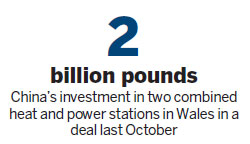UK a beachhead for Chinese firms
Updated: 2016-05-06 06:57
By Cecily Liu(China Daily Europe)
|
|||||||||
Construction companies using advantages such as the ability to provide financing for infrastructure to gain a foothold in West
Chinese firms are making unprecedented moves to build infrastructure projects in the United Kingdom such as power plants and commercial and logistics centers, using the country as a first point of entry into mature Western markets.
This comes as the infrastructure growth rate is slowing in China, and many leading construction firms are looking for growth internationally.
|
A digital sketch of Airport City Manchester, half of which will be constructed by Beijing Construction Engineering Group. Photos Provided to China Daily |
The UK market is unlike places where Chinese infrastructure firms have worked in emerging markets. In those places, they typically create a cost advantage by bringing in a large construction team. In the UK, Chinese firms are finding new advantages in technology, management expertise and financial investment support for projects.
In return, Chinese companies in the UK are gaining valuable experience to be used in other markets.
"We do not expect the majority of the profitability to come from the construction process, because a big portion of the construction work is actually subcontracted to local firms in the UK, and our part is to a large extent a learning process," says Peter Zhang, chief executive of SinoFortone, the UK subsidiary of Liaoning Fortone, a private construction business in Shenyang.
SinoFortone struck a deal in October to invest 2 billion pounds ($2.9 billion; 2.7 billion euros) in two 299-megawatt combined heat and power stations in Wales generating electricity from imported plant waste.
The company will participate in the construction, alongside British firm Orthios, which originally came up with the project's design and now is a minority shareholder.
Yu Dongwen, UK operations director of Beijing Construction Engineering Group, says the UK market's relatively lower profit margin is justified by its lower levels of risks.
"In some developing countries, we have to bear a lot more political, economic and currency risks. In the UK, the sharing of risks is fair and is clearly assigned to the different parties through contracts, so it is a very attractive market for us to work in," Yu says.
BCEG struck a deal to invest 20 percent equity in the 800 million pound Airport City Manchester project in 2013. The company is responsible for 50 percent of the project's construction, which started last year.
The project is expected to create 16,000 jobs in Manchester over 12 years, including 6,500 temporary jobs during construction and 9,500 jobs when complete.
BCEG and SinoFortone's investments fit into a larger trend of recent deals, including CIMC Modular Building Systems' construction of over a dozen hotels in the UK, and CITIC Construction's building of the 1.7 billion pound Asian Business Park in London's Royal Albert Dock. The Asian Business Park project is expected to create up to 30,000 jobs locally and generate 6 billion pounds of growth.
Common to these deals is the construction firms' participation in the funding, which is less common with Western construction firms.
Christopher Bovis, professor of European and international business law at the University of Hull, says Chinese companies' ability to act as both financial investors and construction contractors helps their profitability.
"As a financial investor, they can be incentivized to improve the efficiency of the supply chain and create savings through volume, so that the project will generate better returns."

Chinese infrastructure companies' experience in calculating financial risks also makes them more confident in acting as financial investors.
"These firms have existing relationships with Chinese banks, which have abundant capital. In addition, the large size of many Chinese infrastructure firms also means that they are more competitive than smaller Western infrastructure firms to secure loans from banks," Bovis says.
The Chinese firms' ability to fund projects gives them an advantage in bidding, since the UK's infrastructure sector is looking for fresh funds.
In 2014, a research report by law firm Pinsent Masons and the Centre for Economics and Business Research think tank showed that China has the potential to invest 105 billion pounds in UK infrastructure by 2025 across sectors including energy, property and transport. This figure represents the gap between the UK's current infrastructure needs and investment the government has planned.
The passing of the UK's Cities and Local Government Devolution Act last year means many local authorities will find it increasingly difficult to fund infrastructure, hence private sector money is increasingly important, says Martin Reeves, chief executive of the West Midlands Combined Authority.
"Devolution in England has created a lot of potential autonomy for local areas to become self-sufficient in providing enabling and appropriate infrastructure to accelerate economic growth and prosperity, so having Chinese investors on board for infrastructure deals would reduce the amount of risk we have to bear as local governments and as combined authorities," he says.
Reeves' team estimates the West Midlands area needs 8 billion pounds of infrastructure investment in the next 15 years, but the local authority could only finance 1 billion pounds by itself.
cecily.liu@mail.chinadailyuk.com
(China Daily European Weekly 05/06/2016 page28)
Today's Top News
Search widens for leading overseas professionals
60% of career women say no to second child: report
Testing times
Big hopes as China hosts the G20
Inspectors to cover all of military
Britons embrace 'Super Thursday' elections
Campaign spreads Chinese cooking in the UK
Trump to aim all guns at Hillary Clinton
Hot Topics
Lunar probe , China growth forecasts, Emission rules get tougher, China seen through 'colored lens', International board,
Editor's Picks

|

|

|

|

|

|








